Texas Bar Journal • September 2025
Annual Meeting 2025
Helping Fellow Texans
By Rebecca Johnson, Will Korn, Patricia Busa McConnico, and Eric Quitugua
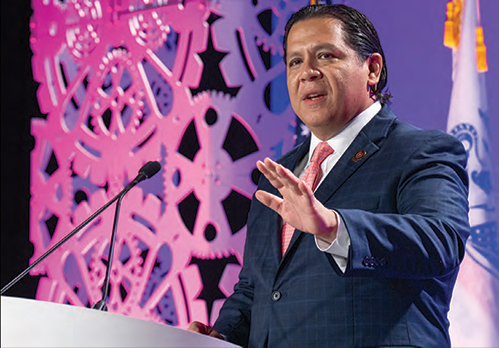
President Santos Vargas at the General Session Luncheon. Photo by Marc
Swendner.
As outgoing State Bar of Texas President Steve Benesh gave his parting remarks during the General Session Luncheon, he said he was overcome emotionally by the opportunity to pass the torch to President Santos Vargas, a partner in Davis & Santos in San Antonio, who is the 145th president of the State Bar. “Now [my voice] is beginning to waiver, because I am overcome by the moment. Not at all because I am about to finish my year as president, not at all,” Benesh said. “It is because of the privilege I have of introducing to you a person of such peerless character and qualities that it is an honor to present him with great anticipation of the amazing year that lies ahead of him.” After a short video highlighting his family origins, his upbringing in Port Arthur, his time at New Mexico Military Institute, and his ambitions as a young law student, Vargas was sworn into office by Supreme Court of Texas Justice James P. Sullivan. Vargas thanked Sullivan and said he wasn’t there to talk about himself but rather his focus for the 2025-2026 bar year, which is “bridging the justice gap for our fellow Texans—for the poor, for the most vulnerable, for the most disadvantaged, for our veterans who have defended and who have died for our freedom, for women in abusive relationships, for our senior citizens, and for our children.” He briefly shared the stories of several individuals from different backgrounds who endured various emotional and physical hardships, but all benefited from increased legal access. Vargas said that he wants to see these legal access efforts expand across Texas during his term as president. He introduced his campaign, “Stand with Santos,” and asked for donations, which benefit the nonprofit Texas Access to Justice Foundation. “This year, I am asking you to stand with Santos, as I work to bridge the justice gap for our fellow Texans,” Vargas said. “Invite me to help you make Texas the best state in the country for veterans, for women, for senior citizens, and for our children.”
Gratitude
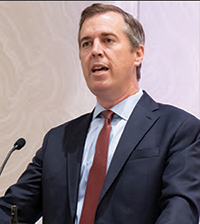
“There’s nobody who was more welcoming and more helpful to me when I got to the court seven and a half yearsago and nobody who was more responsible for helping me discharge my oath than former Chief Justice Nathan Hecht,” said Supreme Court of Texas Chief Justice Jimmy Blacklock in his keynote address at the Bench Bar Breakfast. He said Hecht joined the court in a difficult time in the court’s history—1989—but that he left the court in as strong a position as it has ever been. “Every Texan—young and old, rich and poor, Republican and Democrat—owes Nathan Hecht a great debt of gratitude for all the tireless and selfless and principled work that he did over all those years to promote the rule of law in our state and to make justice a greater reality for every Texan.” Blacklock delivered the State of the Judiciary Address in February to the Texas Legislature and the focus of that speech was making judicial salaries more competitive. The last few days of the session were a scramble, Blacklock said, but in the end, it was an extraordinary result for the judiciary, he said. Blacklock noted that legislators worked out a compromise that achieved two big things: a 25% judicial pay raise across the board and that legislative pensions will no longer be tied to judicial salaries. Blacklock also discussed artificial intelligence, noting that most everyone has heard the stories about hallucinations and the errors, but there are problems beyond that. “But if we do nothing, if we just sort of sleepwalk our way into a world where the first draft of every legal pleading has been written by a sophisticated machine, then I fear that we are courting a future in which no lawyer will ever have sat in front of a blank screen or held a blank notepad and constructed a legal argument all on his or her own,” he said. “And that could be a world in which our justice system ends up becoming derivative of the machine’s way of thinking instead of the other way around. And we may not even know the difference anymore. So maybe we should regulate it. Maybe we should ban it. I think all options should be on the table. And it’s not my decision to make. But one thing I know is that we shouldn’t just throw our hands up and say there is nothing we can do about it. It’s a huge issue for the courts. It’s a huge issue for our society. And there are things we can do about it. If we decide to.”
Prior to Blacklock’s speech, 2024-2025 State Bar of Texas President Steve Benesh kicked off the Bench Bar Breakfast by introducing Judge Bill Miller, who was the 2024-2025 chair of the State Bar of Texas Judicial Section and has served as the presiding judge of the 5th Judicial District of Texas since 2015. Miller talked about the judicial section and judicial compensation. Judge Jesse F. McClure III, who has served on the Texas Court of Criminal Appeals since 2020, also spoke to the crowd, reminding those in the audience that courts should be transparent and accessible and remember what their role is. “In my role in the court, I spend a lot of time talking to judges. I’ve met hundreds of judges across the state,” McClure said. “I can tell you that almost without exception, these are people doing a good job. They may not have the result you like, but the process they are following, you can have faith in.”
Texas Business Court 101
In a session titled “Business Courts: The Types of Cases Filed and What to Expect Next,” moderator Sylvia Cardona, of Rosenthal Pauerstein Sandoloski Agather in San Antonio, introduced panelists Hon. Melissa Andrews, judge of the Texas Business Court 3rd Division in Austin; Ricardo Cedillo, of Davis, Cedillo & Mendoza in San Antonio; and Amy Prueger, of Clark Hill in Austin. As the panelists discussed the basics of the Texas Business Court, Andrews reminded the audience that there is just one Business Court—singular—and it is one collective court with five divisions (Houston, Dallas, San Antonio, Austin, and Fort Worth). She said it is a court of specialty jurisdiction. Prueger said that because the Business Court divisions are in urban areas, cases that would arise in places not in those counties cannot go to the Business Court. Andrews said one of her local rules is that there is a scheduling order for every case. “I think you are going to get a lot of hands-on attention throughout your case,” she said. All of the appeals from the Business Court go to the 15th Court of Appeals, which provides consistency, Andrews said. You always want to win, but you also want to have a solid history, she said. “This is like concierge law for business cases,” Cedillo said.
Forward Thinking
We can’t understand what’s happening to legal education without knowing what’s going on within the legal profession, said Rachel Moran, a professor at Texas A&M University School of Law in Fort Worth. In a session titled “Emerging Trends in Legal Education,” moderator Augustin “Augie” Rivera, of Del Mar College District, and panelists Moran; Patricia Roberts, dean of St. Mary’s University School of Law; and Reynaldo Valencia, dean designate of South Texas College of Law, discussed what they think are emerging trends in legal education. Moran said that going forward, we should be paying attention to technology and privatization. She said all attorneys should be actively involved in the development of new guidelines and ethical standards for emerging legal technologies, ensuring new technologies bridge the access to justice gap for clients who may not speak English or be familiar with the legal system. Valencia said artificial intelligence (AI) is a huge topic at South Texas College of Law. Moran stressed the importance of learning how to use AI ethically and responsibly—and making sure it doesn’t take over using your brain. Roberts wondered why you would pay to go to law school if you are using ChatGPT. She said she sees online delivery and a non-JD education as emerging trends in legal education. Roberts said that St. Mary’s offered the first American Bar Association-accredited entirely online JD program, which attracted nearly 800 applicants for roughly 25 spots. Instruction is both synchronous and asynchronous, and the inaugural class will graduate next summer. She said the school now has close to 1,300 applicants for the roughly 25 spots, and more schools feature online offerings. Roberts said she is seeing an increase in the number of law schools providing undergraduate education offerings in law. She said St. Mary’s offers a business and law major. “Students are seeking to learn about the law at the undergraduate level.”
Making It Work as a Solo
“When I first went out on my own, I was too compassionate,” said Thelma Clardy, of the Thelma Clardy Law Firm in DeSoto. Clardy was referring to the need to set boundaries and time limits on when clients can access you. In a session titled “How to Survive as a Solo Practitioner,” Clardy provided the audience with guidelines for managing a solo practice. In addition to setting access boundaries, Clardy recommended managing client accounts diligently, which means responding to calls, asking clients who text to identify themselves, and trying to respond to clients within 24 hours; documenting communications, which means confirming things in email so you have the information in writing; and drafting engagement letters, which means outlining what you are doing for the client, including the basis for when the client-attorney relationship concludes, and providing fee information. She said if you are talking to a prospective client and a little bell goes off in your head about their ability to pay, then you need to listen to it and not take the client.
Data Privacy Regulations
In a session titled “Recent Developments in Privacy/Cyber Regulations and Enforcement,” Elizabeth Rogers, of Winstead in Austin; Hasan Aijaz, of the Federal Trade Commission in Washington, D.C.; and Matthew M. Ford, a senior assistant attorney general in the Office of the Arkansas Attorney General in Little Rock, Arkansas, discussed the intersection of state, federal, and international privacy regulations in company operations, oftentimes across multiple states or countries. Different states have different data privacy compliance regulations, which can complicate business. “From a compliance perspective, when you work at a company, it’s difficult. You’ve got many different states that now have comprehensive data privacy laws—we’ve branded it to be kind of a nightmare,” Ford said. “By complying with the strictest laws, you are setting yourself up for success, because there’s now limited opportunity to make mistakes somewhere else. Not knowing is not really a defense.”
Guiding Your AI Use
Artificial intelligence (AI) without a human is “dangerous, prone to errors,” but the attorney who collaborates with the technology is “superhuman,” said Joshua Weaver, director of emerging technology innovation at the State Bar of Texas. In a session titled “AI in Law: What’s Changing and How Can You Adapt?” Weaver broke down some ethical considerations tied to the Texas lawyer’s responsibility in using AI while offering examples of popular generative AI tools, effective prompts, and suggestions for data privacy and security. Attorneys can protect the latter with a few pointers: (1) Avoid free software; (2) Pay for enterprise or team software; (3) Read the privacy policy; (4) Confirm you’ve opted out of sharing data; and (5) Obtain a signed agreement that freezes the terms. On generating prompts, Weaver said it’s helpful to question, correct, and revise a prompt anytime results are not as focused on the law as you’d like. The perfect prompt, according to Weaver: “You are a _____ experienced in _____. You are currently working on _____ for _____. Please do _____. Your tone should be _____. Here are some examples, draft similarly: _____.”
‘Working for the People’
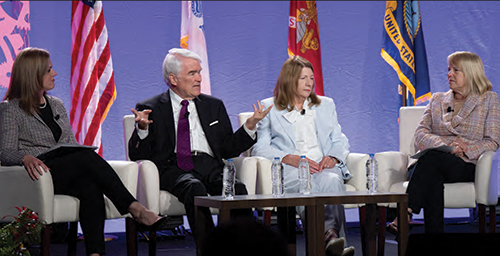
Keynote speakers from left, moderator Kennon Lily Wooten; former Supreme Court of Texas Chief Justice Nathan L. Hecht; Hon. Priscilla Richman, former Supreme Court of Texas justice and current judge of the U.S. Court of Appeals for the 5th Circuit; and moderator Macey Reasoner Stokes at the General Session Luncheon. Photo by Marc Swendner.
‘Working for the People’ At the General Session Luncheon, Kennon Lily Wooten, a partner in Scott Douglass McConnico, and Macey Reasoner Stokes, a partner in Baker Botts and chair of the firm’s Appellate Practice Group, moderated a Q&A with former Supreme Court of Texas Chief Justice Nathan L. Hecht, who retired from the bench at the end of 2024, and his wife, Hon. Priscilla Richman, former Supreme Court of Texas justice (1995 to 2005) and current judge of the U.S. Court of Appeals for the 5th Circuit. The two shared stories about their respective journeys in the law, their inspirations to join the bench and their time spent there, how they met during a 1994 reelection campaign, some of their favorite memories of their careers, and their best pieces of advice. When asked about the most important element of public service on the bench, both Hecht and Richman emphasized the value of trust and a well-earned reputation, as well as carrying yourself with conviction and civility. “You have to say what you think, and you have to say it as powerfully as you think it needs to be said, while being civil and respectful,” said Hecht, who retired as the longest serving justice in the history of the Supreme Court of Texas. “You don’t pull any punches,” Hecht said. “But at the end of the day, we’re all working for the people, and you try to do a good job. You’re always on and you always want people to think well of you and the system.” Richman said there is a certain standard of respect and responsibility that judges must always uphold. “It’s really important, I think, to be calm, to be reasonable, be a good listener, to be an honest broker with your colleagues, your clients, your law clerks, with every person in the courthouse,” said Richman, who was chief judge of the 5th Circuit from 2019 to 2024. “People look at us as judges, and you have to keep that in mind no matter where you are,” Richman said. “Your life has to be open and above board.”
Should We Get Law Enforcement Involved?
In a modern legal landscape in which law firms are increasingly susceptible to cyberattacks, involving law enforcement in the investigation and data recovery processes can be beneficial for several reasons, said Hayley Curry, of DLA Piper in Dallas. In a panel titled “Best Practices and Alternatives for Law Enforcement Engagement in a Security or Data Breach,” Curry, along with Austin attorney Colleen Garcia and San Antonio-based FBI Special Agent James Gerhart, noted the many ways in which law enforcement can aid an organization in its recovery of compromised data: the potential of a full criminal investigation, familiarity with known bad actors, an ability to stop bank transfers or other fraudulent transactions, a faster return to normal operations, restoring a level of trust among clients and the public, deterrence of future incidents, and more. “The idea is that, culturally, the intent of the government is to make companies feel secure in sharing their information with them,” Garcia said. “You are hearing from us that you will be in a better position if you do so.” Garcia added that firms can begin developing familiarity with law enforcement well before any breaches may occur. This prior communication can help smooth out an investigation process and even prevent a future threat, she said.
‘We Remain the Guardians in This Profound Experiment in Human Liberty’

Keynote Speaker former Supreme Court of Texas Chief Justice Wallace B. Jefferson at the Bar Leaders Recognition Luncheon. Photo by Marc Swendner.
In his keynote address during the Bar Leaders Recognition Luncheon, former Supreme Court of Texas Chief Justice Wallace B. Jefferson drew from coincidences in his life and that of his ancestors to show how the great-great-great-grandson of a man enslaved by a Waco judge and Confederate officer became chief justice of the Supreme Court of Texas. His address at the luncheon, which took place on June 19, coincided with Juneteenth, a federal holiday that commemorates the end of slavery in the United States. Jefferson brought attendees back to Reconstruction-era Waco, where his family’s bearing underscored a transition in America—former slaves, newly emancipated, could now “enlist the written word, explore the marvels of science, enjoy the fruits of their own labor, and perfect the Union,” he said. His great-great-great-grandfather, Shedrick Willis, maintained a blacksmith business and was, not long after the Civil War, a Waco city council member. More than a century later in Washington, D.C., in November 1996, a then-33-yearold Jefferson stood before Chief Justice William Rehnquist’s U.S. Supreme Court. He had just been granted the first cert petition he ever filed there. It was in the same room where Thurgood Marshall argued Brown v. Board of Education that Jefferson now was arguing Board of County Commissioners v. Brown, a case centered on police brutality. Before the Civil War, Jefferson’s kin, Willis, was enslaved by Judge Nicholas W. Battle. He had been brought to Waco from Georgia by the Battles and in 1859, was conscripted to shoe Gov. Sam Houston’s steed. Battle, a graduate of the College of William & Mary, served as a lieutenant colonel in the Confederate States Army but returned to his work on the bench during Reconstruction, upholding the recent abolishment of slavery. “After the Union prevailed, Judge Battle was determined to build a new society and Shedrick Willis, now free, was able to turn to his blacksmith craft, this time keeping the money that his labor earned,” Jefferson said. “Nicholas Battle announced in front of his fellow Confederate veterans, and the bar, and his community that he would follow his oath to a constitution that now guaranteed freedom from slavery and secured the right to vote,” he said. Battle and Willis were soon after the war colleagues when Willis’ city council appointed Battle as Waco city attorney in 1870. Not five years after the war, these two, now co-equals, guided the city into a new era. “This is how the great-great-great-grandson of a slave owned by a judge became chief justice of Texas,” Wallace said. “It is us, all of us as lawyers, we remain the guardians of this profound experiment in human liberty.”
Women on the Move in Sports Law
Blake Hart, of Vela Wood in Dallas; Lesli Harris, of Kelly, Hart & Hallman in New Orleans; and Katie Brown, assistant professor in Texas Tech University’s Department of Kinesiology & Sports Management in Lubbock, surveyed their individual journeys through the world of sports law during a panel titled “She’s Got Game: Women Making Legal Moves in Sports.” The panelists fielded questions from moderator Marguerite Zamora, of Alyce Zawacki Law in Austin, sharing their views on the current state of sports law, how its landscape has changed over the years, and their best advice for those individuals, particularly women, interested in a career in sports law. “Every person you talk to and every conversation you have can lead to something,” said Hart, who served as a legal intern for the NBA’s Denver Nuggets while in law school. Harris, who has represented both the NBA’s New Orleans Pelicans and the NFL’s New Orleans Saints in trademark litigation, said she took advantage of every opportunity she was given. “I spoke at everything I was invited to, and that led to me building up clients since I became an expert in the field of sports law in New Orleans.”
Advocating for the Profession
“The Texas Legal Legends Panel” spotlighted the lives and careers of James C. Harrington, founder of the Texas Civil Rights Project who advocated for worker’s rights alongside César Chávez and the United Farm Workers; and Gerry Goldstein, a partner in Goldstein & Orr whose work as a criminal defense attorney includes high-profile cases involving Manuel Noriega, Deep Throat, and the “Chicago Seven.” “It’s really important we embrace our lives as lawyers in this country,” Harrington said, later suggesting attorneys take on significant cases even if the odds of prevailing are slim to none. “I think it’s important we keep those constitutional values in front of us and not compromise those.” The conversation with Harrington and Goldstein was wide-ranging with the two musing on the lawyer’s responsibility to mentor rookies, keeping a cool head in court, and the tenets of the profession. Both underscored a message of protecting the functions and integrity of the legal system in times when the legal world is under fire. “When institutions like the judiciary and the legal profession are under attack, you have to speak up in your spaces,” Goldstein said.
50-Year Lawyers

Photo by Marc Swendner.
The State Bar of Texas recognized 924 lawyers for their 50 years of membership, with more than 85 of those honorees attending a celebratory reception that provides them with an opportunity to catch up with colleagues and friends and featured a visit from State Bar of Texas President Santos Vargas, President-elect G. David Smith, Immediate Past President Steve Benesh, Past President Cindy V. Tisdale, Chair of the Board Britney E. Harrison, Immediate Past Chair of the Board Paul K. Stafford, and Executive Director Trey Apffel.
When Does Marketing Cross the Line?
Generative artificial intelligence tools are only as good as their data, said Todd Wilson, of Law Office of Todd A. Wilson, in Austin. In a session titled “Ethical Online Advertising & Software Considerations for Small to Mid-Size Firms,” Wilson used six case studies to illustrate generative AI issues existing now, including submitting a legal brief without verifying the information in it; citing a case that does not exist; keyword advertising buys; online reviews; and third parties using generative AI for marketing. Wilson said that if you are using marketing tracking software, you need to be aware of potential ethical concerns. For example, you should know how it tracks with cookies because it could be collecting private, sensitive data without permission or consent, he said. How much targeting is too much targeting? “We know that if you are a personal injury lawyer, you can’t go to the hospital and ask if someone needs a lawyer,” Wilson said. “But can you use software to see who needs a mechanic? Can you use software to track who has a five-figure salary, is married with kids, and is registered on a dating app?” he asked.
The Continued Evolution of Name, Image, and Likeness
Antitrust litigation against the NCAA’s compensation prohibition was perhaps the main driving force behind the current evolution of name, image, and likeness (NIL) contracts for collegiate athletes, said R. Brooks Moore, of Texas A&M University’s Office of General Counsel in College Station. In a session titled “Name, Image, and Likeness—College Sports and Athletes,” Moore highlighted the progression of how NIL has grown since 2021, from restrictions to third-party collectives only to direct university payments now authorized by the House v. NCAA settlement passed on June 6, 2025. He said HB 126, which passed in the 89th Texas Legislature and became effective June 5, 2025, allows athletes to enter into NIL agreements directly with the universities where they play. Moore said new legislation has introduced some guard rails to an arena that was widely viewed as a free-for-all. For instance, student athletes are required to disclose their contracts to a clearinghouse (“NIL Go,” run by Deloitte) prior to entering into them. The purpose of this clearinghouse, he said, is to prevent “pay-for-play” payments disguised as commercial and/or endorsement deals that embody NIL. According to Moore, several open ends still exist and additional guidance will be needed. “We have more clarity than we had a couple of years ago in terms of antitrust exposure, but that’s just one settlement,” he said. “That issue is not completely settled.”
Copyright Issues in AI
Intellectual property attorney Jonathon K. Hance, of Bracewell in Houston, gave overviews of existing AI caselaw, legislation, and U.S. Copyright Office guidance in a session titled “Copyright Issues in Artificial Intelligence and Machine Learning.” The Copyright Office views existing law as sufficient to resolve whether copyright protection applies. For example, “[h]uman authors are entitled to copyright in their works of authorship that are perceptible in AI-generated outputs, as well as the creative selection, coordination, or arrangement of material in the outputs, or creative modifications of the outputs,”Hance said. However, copyrights do not apply to purely AI-generated material or material with “insufficient human control over the expressive elements.” As the technology currently stands, prompts alone do not provide sufficient control for a work to be considered authored by a human. Determining authorship must be done case by case. Hance provided a list of caselaw for reference on how the courts have handled AI-centric copyright infringement disputes, including the oft-cited Thomson Reuters v. Ross; Tremblay v. OpenAI, Inc.; New York Times v. OpenAI Inc.; Concord Music Group, Inc. v. Anthropic; and Thaler v. Perlmutter.
Texas Bar Foundation
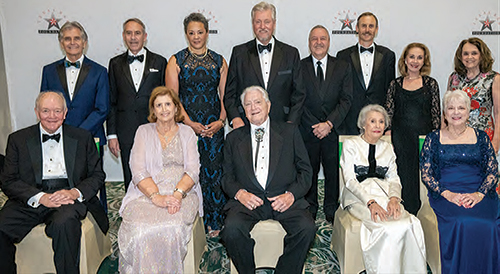
2024-2025 Board of Trustees Chair Carlos Eduardo Cárdenas; Gregory S. Coleman Outstanding Appellate Lawyer Award recipient Jeffrey S. Levinger; Terry Lee Grantham Memorial Award recipient Amy M. Stewart; Ronald D. Secrest Outstanding Trial Lawyer Award recipient William H. Ford; Outstanding Law Review Article Award recipient Gus G. Tamborello; Lola Wright Foundation Award recipient Andrew S. Murr; Samuel Pessarra Outstanding Jurist Award recipient Senior Justice Debra Lehrmann, Supreme Court of Texas; and 2024-2025 Fellows Chair Sara E. Dysart. Above seated: Outstanding 50 Year Lawyer Award recipients Andrew L. Kerr, Hon. Diane DeVasto, Luther H. ‘Luke’ Soules III, Hon. Ruby Kless Sondock, and Barbara K. Runge. Photo by Marc Swendner.
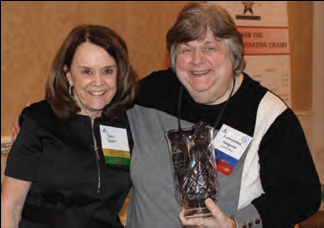
2024-2025 Fellows Chair Sara E. Dysart and Dan Rugeley Price Memorial Award recipient Georganna L. Simpson. Photo by Marc Swendner.
The Power of Storytelling in Legal Writing
Dallas attorney Chad Baruch emphasized the importance of great storytelling as the essence of high-quality legal writing, particularly briefs and opinions. “I almost never sit down and think about writing a piece of legal writing. My first thought always is ‘How am I going to tell this story?’” said Baruch, during a session titled “Legal Writing: Lessons from the Bestseller List.” He highlighted several elements that make a good story when submitting a brief—having positive values, a narrative and ending familiar to the reader, theme development, and brevity in the introduction when covering case details and initial points. “I consider it a failure—a monumental defeat—if I don’t file the shortest brief in every appeal I’m involved in,” Baruch said. He then shared some thoughts and tips from judges he has worked with about syntax and construction and followed with a few of his own principles, including: crafting powerful sentences of an average of around 20 words; carefully choosing words; using signal words, such as “and,” “but,” “yet,” and “moreover”; minimizing parenthetical references; numbering reasons within an argument; and eliminating the passive voice in the story.
Lessons From the Beatles Breakup
What can attorneys learn from the breakup of the Beatles? Andrés Correa and Christopher Patton, both of Lynn Pinker Hurst & Schwegmann in Dallas, addressed this question in a session titled “The Long and Winding Road: Lessons from Litigating the Beatles Partnership Dissolution,” sponsored by the State Bar of Texas Business Law and Corporate Counsel sections. Noting that the Beatles broke up as the result of a lawsuit, Patton said a close study of the suit and surrounding events holds “lessons for us as litigators.” He detailed problems with the band’s original contract with its manager, Brian Epstein, that made it unenforceable in the U.K. After Epstein died, the Beatles decided not to hire a replacement but to manage themselves. The band functioned as a partnership where each member had one vote, with majority ruling. Decisions over how to renegotiate contracts with record labels, creating their own label, and managing finances were decided under this new system. Patton said this system contributed to the band’s dissolution via a lawsuit brought by Paul McCartney, who was essentially “a minority shareholder who was unhappy” with decisions voted in by his bandmates. The panelists described a public relations war between the factions, and how public opinion—which might have been based on misinformation—seemed to influence court rulings throughout the case. The panelists discussed several takeaways. First, “Suing against all odds,” as McCartney did, “can work.” Second, “The best defense is a good offense.” And finally, “You can’t change the facts, but you can inoculate them.” That is, an attorney can give an explanation of the facts that helps a judge or jury see them in a different light, they said.
Custodian War Stories
When dismantling the practice of a deceased
attorney, the work of a custodian can be isolating and
emotionally fraught for everyone involved, panelists
of “Custodian War Stories of Wrapping Up Another
Attorney’s Practice” said. The process of gaining
access to a facility and files and notifying clients can
get messy. Allegations of money missing and files
being lost; clients angered when their new attorney
erroneously believes there may be a second will only
for the mystery will to not exist—these are just two
of the examples members of the panel—Michael S.
Martinez, of Martinez Hsu in Bedford and a member
of the State Bar of Texas Law Practice Management
Committee, and Kristin Postell, of the Law Office
of Randy Wilson and Kristin Postell in Abilene—
experienced in the cessation of another attorney’s law
practice. It’s one of the reasons they say an attorney
should put a plan in practice sooner rather than later.
Key takeaways: (1) Utilize the deceased attorney’s
staff, if available, as staff may have access to case files
and the attorney’s credit card; (2) Bill your time and
staff time and record expenses under the client (think
of out-of-pocket expenses such as postage); (3) If
necessary, enlist court assistance to access an IOLTA
account that can be transferred to the estate; (4) Take
out a life insurance policy for your law firm; and
(5) If you’re going to merge with another practice,
land on a business structure, whether it’s a limited
liability company, corporation, or something else. For
information on succession planning, go to texasbar.com.
Texas Young Lawyers Association
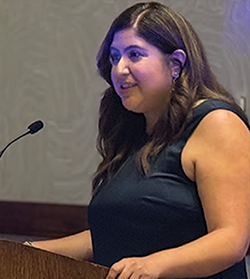
Alyson A. Martinez speaks after being sworn in as 2025-2026 TYLA president during an evening reception that acknowledged the group’s projects, previous officers, new leaders, and outstanding attorneys. To see a list of award winners, go to texasbar.com/annualmeetingawards. Photo by Geoffrey Hinkson.
Say What?
When does a catchphrase go from viral to branded content? It has to be definite; it needs to be associated with a good or service, said Shirazi Jaleel-Khan, of SZJ Legal in Houston. In a session titled “‘Is It a Trademark?’ The Influencer Economy and TM Considerations When Going Viral for Catchphrases on Social Media,” moderator Nicole Sallie, of Tastemakers Legal, and panelists Jaleel-Khan and Kirby Drake, of Kirby Drake Law in Dallas, discussed the big business of influencers. Information can be gleaned from the comments, especially when the audience itself seeks out products from the influencer, like when a fan says, “We love this, would you put it on a T-shirt,” Sallie said. It might be a phrase on its own; it might be descriptive, Drake said. She provided some examples, explaining that Taylor Swift either individually or through her management company has filed numerous trademark applications. Some of these applications are for lyrics or related to album titles. Some of them did get put into use, but many of them were done preemptively to block other people from using them and many expired, Drake said. Another example is Paris Hilton and her phrase, “That’s hot,” Drake said. Hilton did receive some registrations on that, Drake said, noting that Hilton sued Hallmark when it tried to use that phrase on a greeting card. The parties later settled the case.
Connecting Via LinkedIn
In a session titled “LinkedIn 101: Ethical & Legal Issues in Social Media,” Peter Vogel, of Peter S. Vogel, PC, presented the audience with some advice on how to improve a LinkedIn page. First, include a photo behind your profile, he said. Second, you need at least 501 connections, he said. If you have fewer than 501, then the number of connections you have will appear on your page, he said. Your profile page should be what you want potential employers, clients, or other people to know about you, he said. Vogel said he uses LinkedIn to find people to connect with. He said he searched “General Counsel in Dallas” and went through 850 connections and found 26 people he wanted to meet. As a result, he ended up doing business with them, he said.
